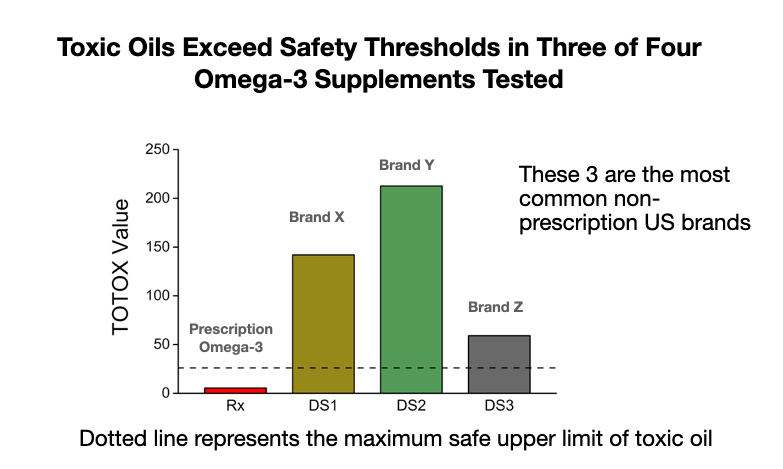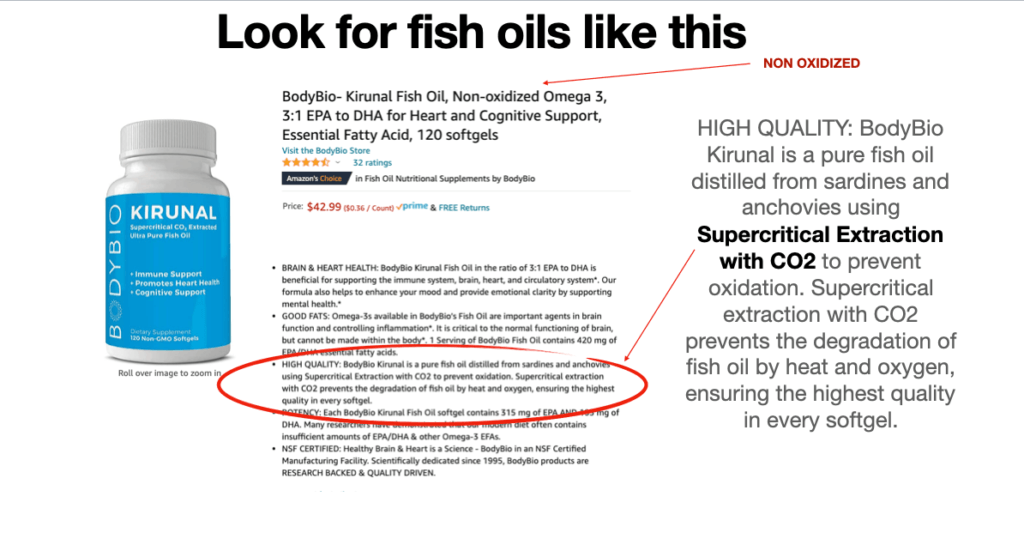
Should I Take Fish Oil Supplements? Benefits and Harms
Table of Contents
- Why it’s time to talk about fish oil supplements.
- Why would anyone want to take fish oil?
- Fish oil: Hype or Scam
- The reason you should NOT take MOST fish oil supplements.
- Numerous toxins develop during fish oil processing.
- Why does processing damage fish oil?
- The one thing you need to see on any fish oil supplement label before buying it.
- If Your Metabolism is Healthy Your Body Can Make “Fish Oil.”
Why it’s time to talk about fish oil supplements.
In the late 1990s, doctors learned that oily fish contains beneficial omega-3 fatty acids not easily found in the food supply and started recommending oily fish and fish oil supplements to their patients. Twenty years later, fish oil became America’s most popular dietary supplement. Eight percent of all US adults are now taking fish oil or some form of omega-3, which is pretty astounding when you consider that nobody had heard of either one back in the 1990s, and pretty much zero percent of people were taking it.
Other supplements that are the same idea as fish oil, meaning they’re supposed to have the same benefits and can have the same drawbacks, are krill oil, DHA/EPA, algae oil, and good old-fashioned cod liver oil. All of these contain long-chain omega-3 fatty acids that are essential building blocks for our brain and nervous system.
Quick Summary:
This article will help you understand if you should take fish oil and omega-3. Learn what supplement companies don’t tell you about their product: processing can turn beneficial omega-3 fatty acids into toxins. You’ll also fish oil hasn’t lived up to its hype and why not. Last, you’ll get tips for finding the best fish oil supplements.
Why would anyone want to take fish oil?
The reason people take fish oil is for the special set of omega-3 fatty acids: DHA and EPA. These letters stand for the chemical names for two specific kinds of omega-3 fatty acids that our bodies need to help control inflammatory reactions, prevent blood clotting, and build healthy cells, especially in our nervous system.
Marketing claims around fish oil include:
- Anti-inflammatory benefits
- Brain building effects
- Help for dry eyes
- Helps to prevent AMD (the most common cause of blindness)
- Helps people with fatty liver
- Helps reduce pain in rheumatoid arthritis
- Reduces triglycerides
- Prevents heart attacks
- Prevents strokes
- Prevents the onset of mental disorders in those at risk
- Prevents Alzheimer’s
That’s a lot of wonderful things! But is it possible that one little capsule could really do all this?
Fish oil: Hype or Scam
A decent question, one that I’ve seen a lot of people asking on Google because more and more we’re learning the supplement industry is rife with profiteering bandits—just like the pharmaceutical industry. So let’s take a look at the complete answer to the hype or scam question.
The bottom line is it’s not just hype.
Fish oil’s supposed benefits are not completely fraudulent claims because there is some basis in reality.
It is totally true that omega-3 fats represent a family of nutrients our body requires but cannot make on its own so we need to eat, drink, or otherwise consume these nutrients in order to be healthy. If we don’t, we’ll be deficient in nutrients and by definition malnourished. When we’re nutrient-deprived and malnourished, all kinds of things can go wrong with our health.
Conversely, if we are malnourished and have developed any of the many medical problems that develop due to lack of the omega-3 family of fatty acids and suddenly start getting plenty, then that one change can reverse many medical problems. So health claims made by supplement companies are not entirely fictional.
Unfortunately, the reality of fish oil supplementation does not come close to the potential.
The reason you should NOT take MOST fish oil supplements.
The sad truth is that most fish oil supplements are actually bad for you.
Multiple studies show that fish oil supplements are loaded with toxins. You may think I’m talking about environmental toxins, like PCBs or mercury, and other pollutants. Those are in fish, too, but that’s not what I’m talking about. The kinds of toxins I’m talking about are actually more harmful than heavy metals and PCBs.
We have to consider that fish oil is a processed food product. We’re not necessarily getting that special omega-3 family of fatty acids that we think we’re getting when we’re taking fish oil instead of eating oily fish. It has to do with the impact of processing on the omega-3 family of fats.
Numerous toxins develop during fish oil processing.
These toxins are not environmental pollutants and don’t exist in fish. After processing, they are present in fish oil in much greater quantity than any environmental pollutants, which makes these toxins a more serious threat to your health.
If fish oil supplements contained fish oil in the form that nature made it, they truly could work well to alleviate numerous ailments. The reason most of these supplements not only fail to show benefits when studied and may do you more harm than good is that very few contain fish oil in the form that nature made it. This is true for omega-3 supplements from plants, too.
What do I mean by “in the form that nature made it”?
Fish oil undergoes a chemical change during processing. The omega-3 fatty acids in oily fish are very fragile and the process of extracting oil from fish damages the oil. The chemical fragility of omega-3 fatty acids presents a manufacturing challenge that is not easily surmounted and only a few companies currently appear to make the effort to mitigate those technical challenges. The rest are selling fish oil supplements that are actually more likely to be harmful to your health than beneficial.
The image below is from a study that looked at three over-the-counter brands and one prescription brand of fish oil. They measured how many toxins were present in each and presented their results in this graph.

It shows that three of the four supplements tested far exceed the threshold of acceptable levels of toxin present on a percentage basis in the oil. All three over-the-counter brands exceed the level dramatically.
It also shows that the prescription omega-3, the stuff a doctor has to prescribe and costs about $200 per month (and insurance may pay for it), actually did not have so much toxin that it exceeded the threshold. But it still had some so that just shows you that these omega-3 fatty acids are very very fragile and they break down very easily and even under the best possible controlled environment of a prescription quality lab you still get some toxins.
Why does processing damage fish oil?
The chemical challenge manufacturers face is called oxidation. Oxidation is one big reason fish oil supplementation has not lived up the expectations. Oxidation transforms the beneficial omega-3 into toxins. This poses two problems to you, the consumer.
First, oxidation destroys the beneficial omega-3 fatty acids. Not all of them, but a lot of them. This loss of omega-3 occurs during the normal heating and refining steps that most manufacturers employ to make their fish oil.
Second, oxidation creates toxins. Oxidation chemically changes the beneficial compounds, creating new ones that don’t exist in fish and in some cases wouldn’t exist without the heating and refining steps of processing. Oxidizing fish oil creates many hundreds of new compounds that simply don’t exist to any measurable level in the fish itself, some of which are extremely toxic.
Unless you know what to look for, any fish oil supplement you buy is very likely to contain unacceptably high levels of toxic breakdown products with known cell killing, telomere shortening, mitochondrial and microbiome damaging, as well as DNA-mutating properties. This makes most fish oil supplements worse than a waste of money. They really should not be available to consumers because they’re loaded with toxins.
The one thing you need to see on any fish oil supplement label before buying it.
Any fish oil supplement company that’s not a complete fraud will be able to speak to this problem of oil oxidation. What you want to look for in the marketing is that the company specifically mentions controlling for oxidation. The actual language may say “non-oxidized” like the supplement in the image below.
The actual technology that they use is called “supercritical extraction with carbon dioxide.” That’s a mouthful, and it’s not just hype actually that’s a real thing. They use carbon dioxide that they pump in to the processing environment to replace the oxygen normally present in the air. That’s one way you can control oxygenation reactions; you just remove the oxygen.

Keep in mind, that this language is a good sign but it’s not a guarantee. It doesn’t necessarily mean that they actually do control for oxidation and that is because this is an essentially unregulated industry. But it does mean that I wouldn’t touch a fish oil that doesn’t say that it’s “non-oxidized” and ideally they would also say how they ensure it’s not oxidized, as this one does: Supercritical extraction with CO2.
If Your Metabolism is Healthy Your Body Can Make “Fish Oil.”
Not all omega-3 is created equal. There’s a common form of omega-3 and a very special form of omega-3. Omega 3 is a kind of fatty acid and it comes in different lengths. Lots of plant and animal foods contain shorter omega-3, but the omega-3 in fish oil is unusually long. Our bodies need both the shorter, 18 carbon form and the unusually long, 20 carbon-plus forms.
If your metabolism is healthy, you can elongate any 18 carbon omega-3 fatty acid into a 20 plus carbon omega-3 fatty acid, thus in a sense manufacturing your own fish oil. If your metabolism is not healthy, the enzymes that elongate omega-3 are not functional.
There’s actually a blood test that you can easily get that will give you a good idea as to whether your body can elongate omega 3 fatty acids. I talk about that in the video below as well as the simple blood test you’ve probably already had that will tell you if your metabolism is healthy enough to make its own “fish oil” from ordinary foods containing omega-3.
Why Trust Me?
Here are a few reasons:
- I’m an MD and the advice given here on DrCate.com is the same I give my patients. If something works, I share it here. If something doesn’t work, I share that here too.
- I studied biochemistry at Cornell U before medical school. That matters because the biochemical value of our foods will be altered by processing, and most folks live off processed oils whether they know it or not.
- I don’t sell any supplements so I have no conflicts of interest. This website is purely educational and so if the information I give out is incorrect, this website does nothing for anyone.
References and Resources
NIH article on Omega-3 Supplementation
https://www.nccih.nih.gov/health/omega3-supplements-in-depth
Articles about Toxins in Fish Oil
https://www.sciencedirect.com/science/article/pii/S0006291X16321878#fig3
https://journals.plos.org/plosone/article?id=10.1371/journal.pone.0244688
This Post Has 37 Comments
Note: Please do not share personal information with a medical question in our comment section. Comments containing this content will be deleted due to HIPAA regulations.
















Hi Cate, what fish oil brands do you know of that meet the requirements you suggest ?
Where can I find an accurate list of safe places to buy actual ocean fresh fish? Not all food is created or farmed equally.
Just finished Dark Calories! Great book that explains many things I’ve heard podcasts spew without providing understanding. What are your thoughts on Fatty 15, the supplement?
Thank you for the compliment! Please do an Amazon review if you have time it realy helps! On fatty 15, like most supplements, it’s a complete waste of money. Some more thoughts here:
Hello,
What about cod livers canned in their own oil (cod liver oil)? Is that an issue? Thank you!
Hi Cate,
I was diagnosed with high triglycerides several years back. I started taking fish oil and it has knocked it down to below the unsafe levels. what should I do?
Feel free to schedule a visit to discuss
Hi Dr Cate,
Are cod livers canned in their own oil problematic?
And I’m curious what your thoughts are on emu oil: https://walkabouthealthproducts.com/
Thank you!
Hi Dr. Cate. The Web doesn’t appear to give me a straight answer to the question “How is canned fish typically cooked?”. A Wikipedia article mentions that sardines can be cooked by deep frying or steam cooking. Can you tell me? I imagine deep frying is done by one of the hateful 8 oils, but how is a consumer to know?
Thank you, and keep up the incredible work,
David
It’s all down to the oil they’re in, really. So buy them in olive oil (best taste) or water.
Thank you for your reply Dr. Cate. However, what if the oil that the fish is cooked in is different than the oil that it is sealed in?
Thanks again,
David
I’m pretty sure it doesn’t work that way because canning is basically cooking while preserving. One step, in other words. But if anyone has worked in the industry and wants to enlighten us, please do!
Darn, I forgot to attach the link. Sorry! Here it is. Below that link is another link to the product we have been using.
https://www.greenpasture.org/blog/polyphenols-and-pigments-in-fish-oil/
https://www.greenpasture.org/product/fermented-cod-liver-oil-liquid/
Hello there. We take fermented cod liver oil in liquid form from Green Pasture Company. I looked for info on their site regarding processing, and found this short article. Could you explain it in layman terminology? I’m having trouble understanding fermentation processing.
Hello dr cate, any thoughts on this cod liver oil? What do you think? https://www.jigsawhealth.com/blogs/news/how-is-jigsaw-alaskan-cod-liver-oil-processed
They say all the right things. Good Find!
I tried to find out more about the heat extraction process for Jigsaw Cod Liver Oil. See their response below. Is this good?
You are very welcome! The Cod Liver Oil is heated to 180 degrees F during processing, which is within the required FDA range.
That’s helpful however it’s only part of what we need to know! The complex refining process can destroy vitamins and create toxins.
Do you consider all PUFA’s bad? Because isn’t omega 3 and DHA in fish and fish oil all technically polyunsaturated fat and even olive oil has some PUFA in it. So is it all pufas that are bad or just the seed oils? And why is that because I thought what made the seed oils bad is that they were PUFA’s.
Ordered the Carlson liquid fish oil supplement: https://www.amazon.com/gp/product/B001LF39RO/ref=ppx_yo_dt_b_asin_title_o03_s00?ie=UTF8&psc=1
Website states “Carlson liquid fish oils are bottled with a touch of antioxidants and are given a nitrogen flush to remove oxygen and to help prevent oxidation.” Curious if that is sufficient to eliminate the toxins. Thanks!
Dr Cate — Thank you for posting the Fish Oil information! I now makes me wonder if the fish oil I use daily is safe.
Do you have any thoughts about Nordic Naturals Ultimate Omega 2X (2150 mg total omega-3s)? Is this a good product to use? I’ve been taking it for a few years. They are claiming to use an “patented oxygen-free manufacturing process”. Below is from their website:
https://www.nordicnaturals.com/consumers/ultimate-omega-2x
EPA: 1125 mg; DHA: 875 mg; Other Omega-3s: 150 mg
Ingredients purified deep sea fish oil (from anchovies and sardines), soft gel capsule (gelatin, glycerin, water, natural lemon flavor), natural lemon flavor, d-alpha tocopherol (antioxidant), rosemary extract (a natural preservative).
No gluten, milk derivatives, or artificial colors or flavors.
All Nordic Naturals’ fish oil products are offered in the triglyceride molecular form—the form naturally found in fish, and the form your body most easily absorbs.* Everything we make is non-GMO and third-party tested, surpassing the strictest international standards for purity and freshness. Certificates of Analysis are available for any product. Nordic Naturals fish oils are Friend of the Sea (FOS) certified and sustainably made in a zero waste facility powered by biofuel.
MANUFACTURING STANDARDS
Most of the concentrated fish oils on the market today are formulated for cost-savings rather than quality and efficacy. Their manufacturing process is cut short, resulting in omega-3s as ethyl ester molecules—synthetic fats with only about 30 years of history in the human diet.
Not at Nordic Naturals. All of our omega-3 fish oil products are produced in the triglyceride form, which is the form naturally found in fish and the form the body most easily recognizes and absorbs.* Triglyceride-form fish oils require more manufacturing steps, and take longer to produce, but for us, there’s no other way. Our patented oxygen-free manufacturing process allows us to deliver industry-leading purity and freshness levels documented by third-party test results.
They offer a full CERTIFICATE OF ANALYSIS on-line where you Enter the Lot Number on your bottle to pull it up.
Any insight would be appreciated.
The less PUFA you eat, the faster you reduce the amount stored in your body.
Dr. Shanahan: Thank you for writing The Fatburn Fix and revealing what the food and medical industries are doing to our “food” and our bodies. We are being poisoned by greed for profit.
I do have one technical correction you might make when the book is next revised. I worked as an operations engineer at a nuclear power plant for 15 years and immediately saw this problem.
On page 81 you state “When you get your household electric bill, the total amount of energy you’ve used is measured in units called watts.” And “Calories and watts are just different units if energy, and they’re actually interchangeable”.
Watt is a unit of power, not energy. Energy is power multiplied by time (watt-seconds or kilowatt-hours). A joule is a watt-second of electricity. Your electric bill usage could be listed as 3,600,000 joules or 1000 kilowatt- hours.
Kilocalorie (calorie) is a unit of energy. We can convert both kilocalorie and watt-minutes into BTUs (British Thermal Units). One BTU is the energy to raise one pound-mass of water one degree Fahrenheit.
1 kilocalorie = 3.966 BTUs
1 Kwh = 3413 BTUs
3.966 BTU/kcal x Kwh/3413 BTU x 1000 watt-hr/Kwh x 60 watt-min/watt-hr =
69.72 watt-minutes/kcal
Or simply Google “kilocalorie to watt minutes” and get 69.78.
Or about 70 watt-minutes / kcal.
“Sitting here reading, you’re burning about 1 calorie per minute (70 watt-minutes), which over the course of an hour equates to 60 calories (70 watt-hours).”
Thanks again for the information (truth) in The Fatburn Fix.
I read The Fatburn Fix with great interest. And you are right. Vegetable oil is in everything! I now read every label and even ask restaurants what oil they fry with. Both my wife and I ate poorly for years. Her legs were heavy when we first met. Over 30 years her weight doubled; most of it in her upper arms, butt, hips, thighs, and calves. We have both been to a nutritionalist who stressed no gluten, sugar, dairy, caffeine, and alcohol; but vegetable oils were not mentioned. My wife lost 100 pounds; but very little reduction in the afore-mentioned areas. She has since gained a lot of the weight back. My wife just took an on line questionaire about lipedema. She scored 100% for lipedema. Does eating (and storing as fat) vegeatable oils exacerbate weight loss problems for those with lipedema?
I would expect so because of the PUFA-induced problems with oxidation and inflammation.
I took fish oil caps for years. I stopped because I no longer wanted to take fish out of the ocean just so they could be ground up to produce fish oil. There are creatures in the sea that need sardines and other oily fish more than I need fish oil caps. I switched to plant based, flax seed oil caps.
I’ve been taking Garden of Life’s Omega-3 supplement semi-daily for awhile. Their site says, “…made from the purest fish oil utilizing dual supercritical CO2 extraction technology that delivers 850mg of omega-3s in just one softgel. Unlike fish oils, which are two-thirds saturated fat, it contains no saturated fat.”
This seems to pass muster based on your criteria. Thoughts?
That does seem to pass muster, yes. Curious what it costs?
I last bought a 2 pack of 60 Soft Gels each, 850mg of omega-3s for $43 total.
How about Dropi? They claim they only do cold processing. Is this good enough?
“It means that during the whole process, we never heat the product over 42°C (107,6°F).”
So interesting how we tend to take a dietary supplement recommendation at face value, forgetting other factors like processing or source. Thank you for this information! We have been using Rosita. They say they have essentially no processing. https://www.rositausa.com/pages/production
Thank you for this information! We have been using Rosita. From the way they explain it, they don’t process the oil at all. https://www.rositausa.com/pages/production
That looks like a good company to buy from if you’re going to buy cod liver oil.
Ha. Interesting ploy. “In their naturally formed and balanced triglyceride state” only means they don’t process it to intentionally remove the fatty acids from the glycerol backbone, and I don’t think there’s a supplement on the market that carries out that process. So in other words they’re blinding us with science. Or trying to. I would skip.
By the way, I scanned your latest book to not find mention of fish oil supplements (perhaps I missed it). Is the info in this blog just your updated research and you do, in fact, recommend it daily?
I’ve never recommended fish oil or cod liver oil. Here’s what I recommend: https://drcate.com/recommended-supplements/ But @Lindsay posted a cod liver oil brand that looks pretty good to me.
Hi Dr. Cate,
I purchase Costco/Kirkland brand “Sustainably Sourced Wild Alaskan Fish Oil”. The label doesn’t make any mention of oxidation, however it says “Kirkland Signature 1400 mg Wild Alaskan Fish Oil offers a whole-food alternative to highly processed fish oils. Our edible oil is made in a food grade facility, using a state-of-the-art cold-pressed extraction process, which retains Omega-3s in their naturally formed and balanced triglyceride state…” Can you help identify whether the “whole-food alternative” Costco/Kirkland brand passes the non-oxidized test?